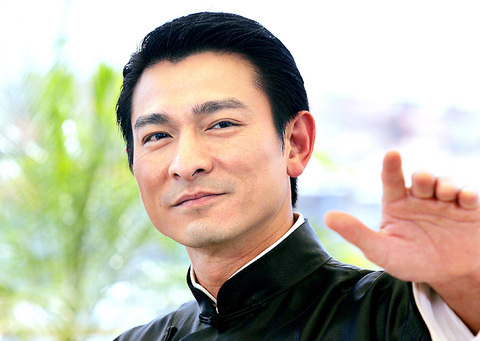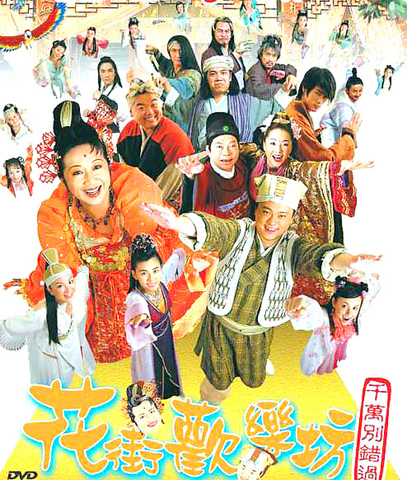This week's only Asian movie whch is being released is Where is Mama's Boy (花街歡樂坊), starring William Hung (孔慶祥), in a role tailor-made for him. The Hong Kong-made costume comedy takes advantage of Hung's comedic talent in the hopes that it will generate box office success.
Hung was a UC Berkeley student who made his name after an audition on US TV show American Idol. His not-so-sexy performance of Ricky Martin's She Bang received harsh comments from the judges but unexpected laughter from TV viewers, and Hung has been widely popular ever since.
Where is Mama's Boy also has many faces familiar to Hong Kong comedies including Wong Yu-fat (黃一飛) from Shaolin Soccer; Lam Tze-chung (林子聰), the chubby partner of Stephen Chow (周星馳) in Kung Fu Hustle; as well as Nancy Sit (薛家燕).

PHOTO: AFP
Hung, famous for his singing and clumsy dance steps, no doubt will perform a few songs in this pseudo-musical, pseudo-martial-arts comedy.
The story of Where is Mama's Boy revolves around a red-light district in south China during the Ming dynasty. Foon Inn is the most famous bar and brothel in the area and draws enough customers -- even from noble families -- to pack the place every night.
Hung plays a happy vender selling clay-oven buns. He does not like to visit the Foon Inn, but he helps the madam and her ladies when it is suddenly closed down by gangsters. After all the vanity is washed away, the women realize the truth of happiness and began to appreciate the beauty of simple lives.

PHOTO COURTESY OF SHENGCHI INTL MEDIA
In other film news, Hong Kong star Andy Lau (劉德華) and his Focus Films (映藝娛樂) last Wednesday announced plans to produce a pack of six Chinese-language projects by up-and-coming filmmakers from across Asia in Hong Kong, Taiwan, China, Malaysia and Singapore.
It is the first time that such a project has been initiated in the region. Each feature film will be produced in high-definition technology and will be shot in its home market using a local cast and production network.
Calling the project Focus First Cuts, Andy Lau said the project is to cultivate a new generation of filmmakers in Asia.
"Besides producing big commercial film projects, we also want to cultivate new filmmakers by arranging the necessary resources and support to realize their potential and reach out to a wider audience," Lau said last Wednesday at Hong Kong Filmart, an Asian film and TV trade show.
Lau said the budget of all six features is planned to be HK$25 million (NT$101 million), with each film estimated to cost about HK$6 million (NT$24 million), which is considered low for Hong Kong filmmaking.
Robin Lee (李芸蟬) represents Taiwan with a film tentatively called Ren Yu Duo Duo (人魚朵朵), a fairy tale about a girl's relationship with shoes. Lee attracted Lau's attention at the 2004 Golden Horse Awards (金馬獎), when Lau saw Magic Washing Machine (神奇洗衣機) and was intrigued by the urban fantasy story, Lee's first short feature, which won Best Short Film.
Also benefiting from the project are Hong Kong's Lam Tze-chung, the Kung Fu Hustle comedian; Wong Ching-po (黃精甫) and Lee Kung-lok (李公樂), who directed the Andy Lau vehicle Jiang Hu (江湖) and the acclaimed indie drama Fubo (福伯); Malaysia's Ho Yuhang (何宇恆); and Singapore's Kevin Tong (唐永健). The Chinese project is yet to be announced.
Star Chinese Movies Network (衛視電影台), a satellite broadcaster under the STAR group, has the rights to exclusive television premieres and broadcasts of the six Chinese-language projects in Asia, except in Japan, South Korea and Thailand.

Dissident artist Ai Weiwei’s (艾未未) famous return to the People’s Republic of China (PRC) has been overshadowed by the astonishing news of the latest arrests of senior military figures for “corruption,” but it is an interesting piece of news in its own right, though more for what Ai does not understand than for what he does. Ai simply lacks the reflective understanding that the loneliness and isolation he imagines are “European” are simply the joys of life as an expat. That goes both ways: “I love Taiwan!” say many still wet-behind-the-ears expats here, not realizing what they love is being an

Google unveiled an artificial intelligence tool Wednesday that its scientists said would help unravel the mysteries of the human genome — and could one day lead to new treatments for diseases. The deep learning model AlphaGenome was hailed by outside researchers as a “breakthrough” that would let scientists study and even simulate the roots of difficult-to-treat genetic diseases. While the first complete map of the human genome in 2003 “gave us the book of life, reading it remained a challenge,” Pushmeet Kohli, vice president of research at Google DeepMind, told journalists. “We have the text,” he said, which is a sequence of

Every now and then, even hardcore hikers like to sleep in, leave the heavy gear at home and just enjoy a relaxed half-day stroll in the mountains: no cold, no steep uphills, no pressure to walk a certain distance in a day. In the winter, the mild climate and lower elevations of the forests in Taiwan’s far south offer a number of easy escapes like this. A prime example is the river above Mudan Reservoir (牡丹水庫): with shallow water, gentle current, abundant wildlife and a complete lack of tourists, this walk is accessible to nearly everyone but still feels quite remote.

It’s a bold filmmaking choice to have a countdown clock on the screen for most of your movie. In the best-case scenario for a movie like Mercy, in which a Los Angeles detective has to prove his innocence to an artificial intelligence judge within said time limit, it heightens the tension. Who hasn’t gotten sweaty palms in, say, a Mission: Impossible movie when the bomb is ticking down and Tom Cruise still hasn’t cleared the building? Why not just extend it for the duration? Perhaps in a better movie it might have worked. Sadly in Mercy, it’s an ever-present reminder of just